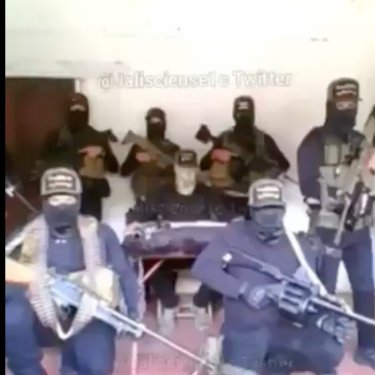Mexican cartel’s video threats against journalists must be taken seriously, RSF says

A Mexican drug cartel’s video threats against TV anchor Azucena Uresti and other journalists and media outlets in the southwestern state of Michoacán must be taken seriously by the Mexican authorities, says Reporters Without Borders (RSF), calling on the government to react immediately and provide them with all necessary protection.
“Wherever you are I will find you and I will make you eat your words even if I’m accused of femicide,” said a man shown seated at a desk, surrounded by heavily-armed masked men, addressing Uresti, a presenter with the TV news channel Milenio. The threats were made in a video released on social media yesterday morning
Identifying himself as Rubén Oseguera, the head of the Jalisco New Generation Cartel (CJNG), one of Mexico’s most powerful drug cartels, the man threatened two other media outlets, El Universal and Televisa as well as Milenio’s Uresti, and called on them to provide “even-handed” coverage of the CJNG’s battles with other groups in Michoacán state.
Speaking on condition of anonymity for security reasons, several Michoacán-based journalists responded today to RSF’s questions about the video. They said the CJNG’s threatening attitude was a reaction to a series of local media reports about the cartel that had revealed sensitive information about its members and had criticised the violence to which the population is exposed, especially in Michoacán’s Tierra Caliente region.
The level of violence has been particularly high in Tepalcatepec, a town that has seen constant clashes between armed groups, continually forcing residents to flee the area. The journalists told RSF they fear reprisals and some have turned to the Federal Mechanism for the Protection of Journalists.
“This shocking and revolting video circulated by the CJNG, threatening journalists and media outlets, recalls past scenes of horror and could escalate violence against the press in Mexico to new, unprecedented heights,” said Emmanuel Colombié, the head of RSF’s Latin America bureau.
“We call on the Mexican government to take these threats very seriously and to respond immediately by implementing all necessary security measures for the media and journalists who have been threatened, especially the TV presenter Azucena Uresti. The Mexican government has a duty to act and to prevent further attacks.”
President Andrés Manuel López Obrador expressed solidarity with Uresti today. “I want to tell her that she has our support,” the president said. “As soon as we learned about this, I gave instructions to contact her. Communication has been established with her, along with a protection mechanism. I categorically denounce these threats. We do not tolerate this kind of situation. We will protect Azucena Uresti and all Mexicans. This is our duty.”
In a tweet yesterday, a few hours after the video’s release, presidential spokesman Jesús Ramírez said the Mexican government would "take the necessary measures to protect threatened journalists and news outlets."
Mexico continues year after year to be one of the world’s deadliest countries for the media and, despite some recent, limited progress, is sinking ever deeper into a spiral of violence and impunity. Journalists who take too much interest in organised crime, especially at the local level, are warned, threatened and then often gunned down in cold blood.
Mexico is ranked 143rd out of 180 countries in RSF's 2021 World Press Freedom Index.



